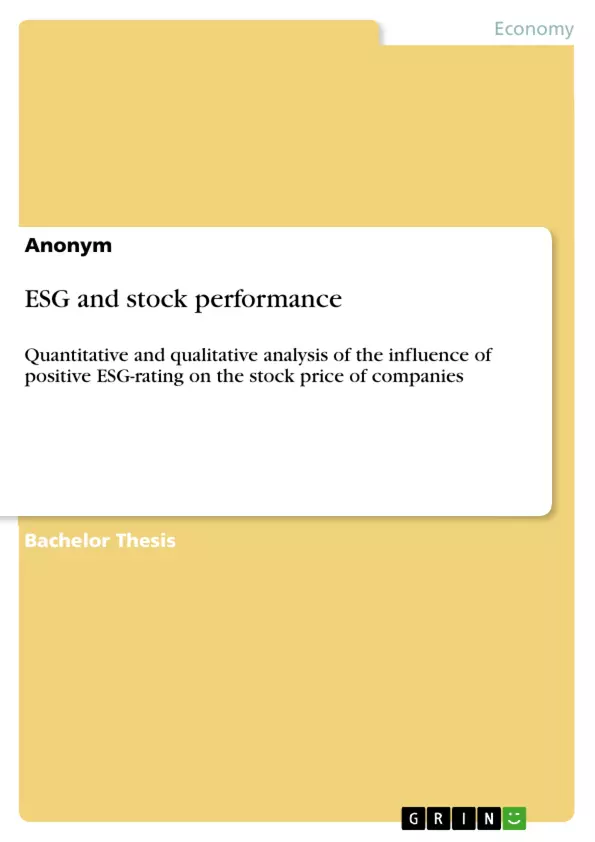This thesis analyzes the effect of positive ESG rating on stock performance. The goal is to provide an overview of the findings from the literature. Also, the thesis provides an empirical study on the ex-post stock performance of positively rated ESG firms as a contribution to the existing literature. However, a considerable issue is that ESG definitions are heterogeneous because there is none general standard in terms of content and measurement. Therefore, the validity of ESG ratings from rating agencies is reviewed.
The structure of this thesis is divided into four chapters. The first chapter introduces the concept of ESG and Corporate Social Responsibility (CSR) in detail. Secondly, ESG rating agencies are subject of debate. Mainly, the divergence in ratings among different rating agencies is analyzed because, for empirical studies, valid ratings are essential to obtain reliable results. The third chapter discusses the existing research papers regarding ESG´s influence on stock performance. It mentions the common hypotheses in this area and examines the results from previous empirical studies. At last, an empirical study, which analyzes the performance of a portfolio consisting of high rated ESG stocks, is constructed. This portfolio is compared with the broad market performance and a portfolio of weak rated ESG stocks in terms of historical returns and the Sharpe ratio.
Inhaltsverzeichnis (Table of Contents)
- 1. Introduction
- 2. Concept of ESG and CSR
- 3. ESG rating agencies
- 3.1 Provider and measurement
- 3.2 Divergence of ESG ratings
- 3.3 Reasons for divergence in ESG ratings
- 3.4 Implications of ESG rating divergence
- 4. Literature overview: The effect of positive ESG rating on stock performance
- 4.1 Theoretical background: Hypotheses in the literature about the effect of positive ESG rating on stock performance
- 4.2 Stock performance of positively rated ESG portfolios in empirical studies
- 4.3 Limitations of discussed empirical studies
- 5. Empirical study: Performance of a positively rated ESG portfolio
- 5.1 Data
- 5.2 Analysis of historical returns and the Sharpe ratio
- 5.3 Results and limitations
- 6. Conclusion
Zielsetzung und Themenschwerpunkte (Objectives and Key Themes)
This bachelor thesis investigates the relationship between ESG ratings and stock performance. It explores the concept of ESG and its divergence across different rating agencies. The thesis further examines the theoretical background and empirical evidence on the impact of positive ESG ratings on stock performance.
- ESG rating divergence and its implications
- Theoretical hypotheses on the relationship between ESG ratings and stock performance
- Empirical evidence on the stock performance of positively rated ESG portfolios
- Limitations of existing empirical studies
- Empirical study on the performance of a positively rated ESG portfolio
Zusammenfassung der Kapitel (Chapter Summaries)
- Chapter 1 introduces the topic of ESG and its importance in the context of sustainable investing.
- Chapter 2 defines the concepts of ESG and CSR and their relevance to financial markets.
- Chapter 3 discusses different ESG rating agencies, including their methodologies, divergence in ratings, and potential reasons for such divergence. It also explores the implications of this divergence for investors.
- Chapter 4 provides a literature overview on the effect of positive ESG ratings on stock performance. It examines theoretical hypotheses and reviews empirical studies on the subject.
- Chapter 5 presents an empirical study on the performance of a positively rated ESG portfolio, including data selection, analysis of historical returns and the Sharpe ratio, and a discussion of the results and limitations.
Schlüsselwörter (Keywords)
The key focus topics of this thesis include ESG ratings, stock performance, sustainable investing, corporate social responsibility, rating agency divergence, and empirical research on the relationship between ESG and financial performance.
Frequently Asked Questions
What does ESG stand for in finance?
ESG stands for Environmental, Social, and Governance criteria used to measure the sustainability and ethical impact of an investment in a company.
Do positive ESG ratings lead to better stock performance?
The thesis explores this relationship, analyzing both theoretical hypotheses and empirical evidence on whether high ESG ratings correlate with superior returns.
Why do ESG ratings differ between agencies?
Ratings diverge because there is no general standard for measurement, and different agencies use various methodologies and content weightings.
What is the Sharpe ratio in ESG investing?
The Sharpe ratio is used to compare the risk-adjusted performance of an ESG-rated portfolio against the broader market.
What are the limitations of ESG empirical studies?
Major limitations include the heterogeneity of ESG definitions and the lack of consistent historical data across different rating providers.
- Citation du texte
- Anonym (Auteur), 2019, ESG and stock performance, Munich, GRIN Verlag, https://www.grin.com/document/981224



